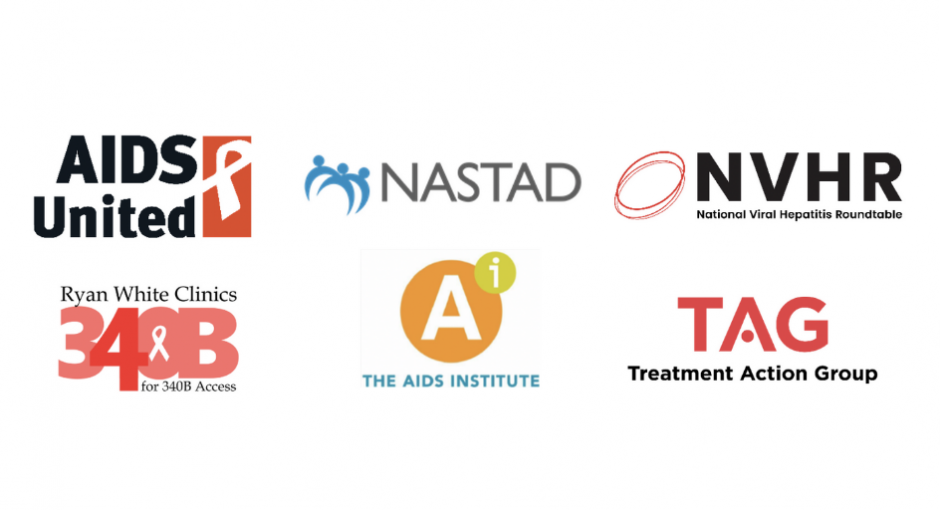UPDATE Thursday, April 21, 2022, 5:00 p.m. EDT—AbbVie issued this statement: AbbVie supports the 340B program and is committed to the program’s goal of improving access to medicines for uninsured and vulnerable patients. Our 340B initiative does not block access to 340B priced medicines for any covered entity of the 340B program and—critically—patients will continue to have uninterrupted access to AbbVie’s medicines. Additionally, our initiative does not affect federal grantee covered entities, such as community health centers, federally-qualified health centers and Ryan White clinics.
Six groups that support patients with HIV/AIDS and viral hepatitis and their caregivers issued a joint statement yesterday criticizing drug manufacturers AbbVie, Gilead, and Merck’s conditions on 340B pricing on hepatitis C medications.
AIDS United, National Alliance of State & Territorial AIDS Directors (NASTAD), National Viral Hepatitis Roundtable (NVHR), Ryan White Clinics for 340B Access (RWC-340B), The AIDS Institute (TAI), and Treatment Action Group (TAG) released the statement. It criticizes the manufacturers’ requirements that 340B hospital and/or grantee covered entities must submit claims data from contract pharmacies to receive 340B drug pricing, and asks that the policies be reconsidered.
A Merck spokesperson said this morning, “Merck’s hepatitis C medicine is not included in Merck’s 340B integrity initiative.” A Gilead spokesperson defended the company’s policy. AbbVie acknowledged a request for comment but has not yet provided one.
“These actions by manufacturers impose an administrative burden on covered entities while diverting scarce resources away from patient care, disincentivize covered entities from developing comprehensive hepatitis C programs to serve patients with complex medical and social needs, and impede our ability to address health inequities and eliminate hepatitis C,” the six groups said.
“Unilateral actions by manufacturers without commensurate measures to support the safety net undermine the shared goals of health equity and viral hepatitis elimination,” the groups said. “340B program integrity efforts must fall within the mandate of the statutory roles of HRSA [the U.S. Health Resources and Services Administration] and HHS [the U.S. Health and Human Services Department ] and any actions aimed at preserving the congressionally-authorized function of the 340B program require collaboration and consensus across all stakeholders. Amid the COVID-19 pandemic and in the absence of equitable alternatives, progress towards eliminating hepatitis C as a public health threat by 2030 requires maintaining and preserving established and predictable models of health care financing and delivery for underserved populations.”
“We strongly encourage manufacturers of hepatitis C medications to reconsider their 340B covered entity reporting requirements and contract pharmacy limitations, and work with stakeholders towards meeting the shared aim of forging an equitable path towards curing and ultimately eliminating hepatitis C,” the groups said.
Gilead said last month that starting May 2, 340B hospital and grantee entities will have to provide claims level data for Gilead’s branded hepatitis C products to be able to continue to be eligible for bill to / ship to orders for multiple contract pharmacies.
“Sharing of claims level data is a necessary step toward achieving greater transparency in the 340B program and will help Gilead address inappropriate duplicate discounts and diversion while also bolstering the integrity and sustainability of the program,” Gilead said this morning. “The claims level data being requested is similar to the data Gilead receives from other purchasers and payers; the data request is tailored to minimize burdens on covered entities while mitigating duplicate discount and diversion concerns.”
Merck’s requirement, for hospitals only for now, applies to its products dispensed through retail, specialty, and outpatient pharmacies. Merck asked grantee entities to supply their claims date for contract pharmacy utilization voluntarily. It said it will “evaluate program participation of federal grantees to determine if further action is warranted.”
“Merck’s hepatitis C medicine is not included in Merck’s 340B integrity initiative,” a spokesperson said. “Merck strongly supports the 340B Program as a mechanism for helping safety net facilities provide health care services to the vulnerable patient populations that they serve. However, the program has grown well beyond its intended purpose and requires greater transparency, regulatory oversight, and accountability to ensure that it continues to effectively serve patients as intended and remains sustainable over the long-term.”
AbbVie has a similar requirement, also for hospitals only, applicable to 25 of its products, including the hepatitis C virus treatment Mavyret.


